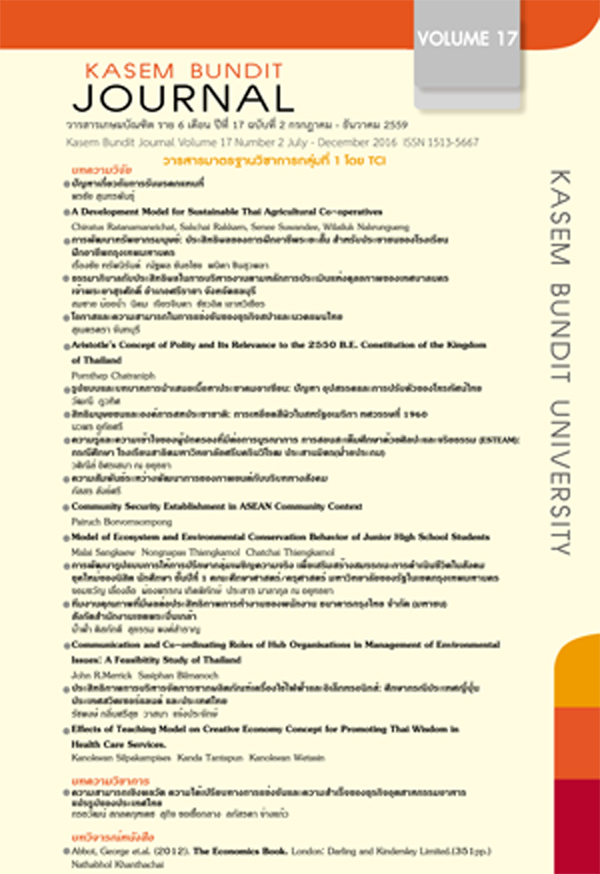A Development Model for Sustainable Thai Agricultural Co-operatives
Keywords:
Business economics, Supply chain development, Agricultural co-operativesAbstract
Abstract
Nowadays Thai agricultural co-operatives face tremendous changes from domestic and international business environments as well as changes in their co-operative member and customer needs. This paper demonstrates how to develop a sustainable agricultural co-operative using a case study of Phak Hai Agricultural Co-operative Ltd. We spent 3 years for collecting, studying and analyzing not only qualitative but also quantitative data. Starting from ordinary functions, this agricultural co-operative provided such services for their members as rice milling, rice drying, seeds, fertilizer, and marketing. Firstly, we applied a model of vertical business development by introducing flooding endurance rice seeds to be planted, using contract farming, and creating a rice brand. Then, we created horizontal business links along their supply chain by means of an alliance with local investors to build a quality controlled mill, trade connection with traditional and modern retail trade as well as opening mobile shops as marketing channels. Finally, we aimed to fulfill their member needs, local people needs and our country needs by establishing a farmer market as a center of trading local agricultural products. As a result, Phak Hai Agricultural Co-operative Ltd. was able to increase their new members by more than 25% at the end of the third year.
บทคัดย่อ
ปัจจุบันสหกรณ์การเกษตรไทยต้องเผชิญกับการเปลี่ยนแปลงอย่างมากจากสภาพแวดล้อมทางธุรกิจในประเทศและต่างประเทศ การเปลี่ยนแปลงในความต้องการของสมาชิกสหกรณ์ รวมไปถึงการเปลี่ยนแปลงในรสนิยมความต้องการของกลุ่มลูกค้าสหกรณ์ งานวิจัยชิ้นนี้แสดงให้เห็นถึงขั้นตอนและวิธีการในการพัฒนาสหกรณ์การเกษตรอย่างยั่งยืนโดยใช้กรณีศึกษาสหกรณ์การเกษตรผักไห่ จำกัด การวิจัยครั้งนี้เป็นการวิจัยแบบผสมผสานทั้งการวิจัยเชิงคุณภาพและปริมาณ คณะผู้วิจัยใช้ระยะเวลา 3 ปีในการเก็บรวบรวมข้อมูล การศึกษา และการวิเคราะห์ข้อมูลทั้งเชิงคุณภาพและเชิงปริมาณ โดยเริ่มต้นจากบทบาทหน้าที่ของสหกรณ์การเกษตรแบบทั่วๆ ไป กล่าวคือ การจัดหาและให้การบริการต่างๆ ที่เกี่ยวข้องกับการทำนาสำหรับสมาชิกสหกรณ์ อาทิ การสีข้าว การตากข้าว การจัดหาเมล็ดพันธุ์และปุ๋ย รวมไปถึงการขายข้าวที่ได้จากสมาชิกสหกรณ์ คณะผู้วิจัยใช้รูปแบบของการพัฒนาธุรกิจในแนวดิ่งมาประยุกต์โดยการจัดหาเมล็ดข้าวพันธุ์ที่มีความทนต่อภาวะน้ำท่วมซึ่งเป็นปัญหาหลักที่เกษตรกรในพื้นที่ประสบ มาให้สมาชิกสหกรณ์เพาะปลูกโดยการทำสัญญาการเกษตร (Contract Farming) และการสร้างตราสินค้าให้แก่ผลผลิตข้าวของสมาชิกสหกรณ์ จากนั้นคณะผู้วิจัยได้สร้างการเชื่อมโยงธุรกิจในแนวนอนตามห่วงโซ่อุปทานของสหกรณ์การเกษตรด้วยการสร้างความร่วมมือและเป็นพันธมิตรกับนักลงทุนในท้องถิ่นเพื่อสร้างโรงสีข้าวที่มีการควบคุมคุณภาพการผลิต และเชื่อมโยงการค้ากับร้านค้าโชห่วย (Traditional Trade) ห้าง โมเดรินท์เทรด (Modern Trade) และสร้างช่องทางการตลาดผ่านรถขายสินค้าเคลื่อนที่ (Mobile Shop) และท้ายสุด คณะผู้วิจัยมีวัตถุประสงค์ที่ต้องการจะเติมเต็มความต้องการของสมาชิกสหกรณ์ ชาวบ้านในท้องถิ่น และประเทศชาติ ด้วยการให้คำปรึกษาแก่ผู้บริหารสหกรณ์การเกษตรในการสร้างตลาดสินค้าการเกษตรที่จะเป็นศูนย์กลางในการซื้อขายสินค้าภายในท้องถิ่นเพื่อตอบสนองต่อความต้องการของเกษตรกรในท้องถิ่นอย่างยั่งยืน ส่งผลให้สหกรณ์การเกษตรผักไห่ จำกัด มีจำนวนสมาชิกเพิ่มขึ้นมากกว่า 25 เปอร์เซ็นต์ ในการศึกษาวิจัยปีที่สาม
Downloads
Published
How to Cite
Issue
Section
License
ทัศนคติ ความคิดเห็นใด ๆ ที่ปรากฏในวารสารเกษมบัณฑิตฉบับนี้เป็นของผู้เขียน โดยเฉพาะ มหาวิทยาลัยเกษมบัณฑิตและบรรณาธิการ ไม่จำเป็นต้องมีความเห็นพ้องด้วย







